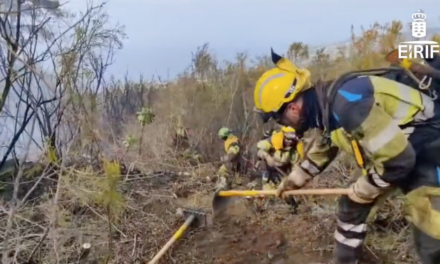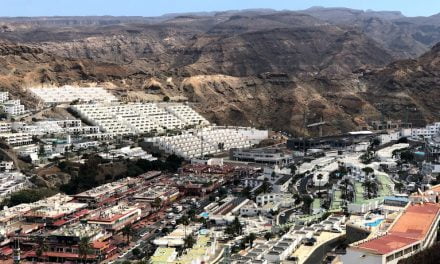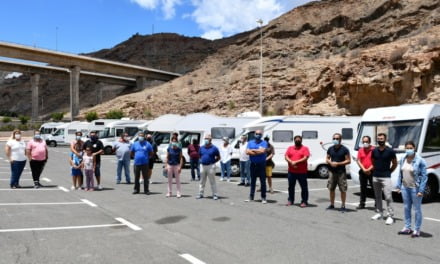Maspalomas Pride, once a grassroots celebration created by the local LGBTQ+ community, has increasingly shifted towards commercialisation, losing touch with its original spirit and the businesses that once thrived on its success. Members of GLAY (Gays y Lesbianas Asociados del Yumbo), who played such a crucial role in establishing Pride with the Ayuntamiento de San Bartolomé de Tirajana town hall, and others, have long warned that since the so-called “Freedom” association took over their annual event, it has deviated from the community roots out of which it first grew, transforming into a large-scale dance party devoid of its authentic, international charm.
Local businesses at the Yumbo Centre, historically the heart of Maspalomas Pride, have voiced deep concerns over declining sales and attendance. Reports indicate that revenues have dropped by 40% to 55% compared to previous years, marking the fifth consecutive year of such declines. The general consensus among business owners is that this year’s edition of Pride was particularly lacklustre in both turnout and profits.
One business owner lamented the absence of high-spending English tourists, noting a shift towards cheaper purchases. Comparisons were drawn with the Winter Pride event, which has reportedly attracted more affluent visitors in recent years and generated higher earnings. It is worth noting that Winter Pride was initiated by the team originally hired by GLAY to grow the main event, but who decided themselves to launch a new event, which has produced muted success for the organisers. It is also worth noting that British tourism on the whole represents some 12% of Canary Islands economic revenues, according to figures offered by the British consuls.
British tourism on the whole represents some 12% of Canary Islands economic revenues
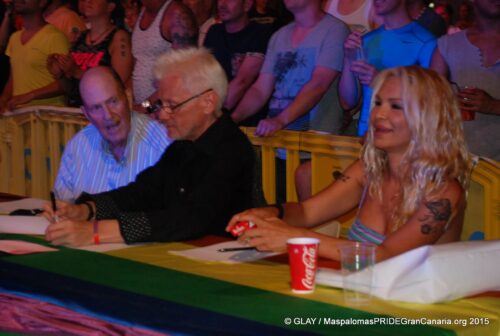 The Maspalomas PRIDE Gran Canaria, started by Yumbo businesses, GLAY+ Maspalomas working with their town hall and a vibrant community, since at least 2001, aimed from the start to boost the local economy during the quietest month of the year, May. That Maspalomas, and The Yumbo, held all the right ingredients is testament to those early pioneers, who saw the opportunity to raise the rainbow flag above what was back then still a fundamentally conservative township. The destination had long welcomed LGBT visitors and this was a chance to share that open-mindedness with the world. The event acted as a beacon for diversity on Europe’s very southern frontier. Maspalomas called, and the world answered.
The Maspalomas PRIDE Gran Canaria, started by Yumbo businesses, GLAY+ Maspalomas working with their town hall and a vibrant community, since at least 2001, aimed from the start to boost the local economy during the quietest month of the year, May. That Maspalomas, and The Yumbo, held all the right ingredients is testament to those early pioneers, who saw the opportunity to raise the rainbow flag above what was back then still a fundamentally conservative township. The destination had long welcomed LGBT visitors and this was a chance to share that open-mindedness with the world. The event acted as a beacon for diversity on Europe’s very southern frontier. Maspalomas called, and the world answered.
This “Freedom” Association was constituted specifically to acquire the community licence to operate the Pride event in Maspalomas, and then excluded the event founders completely. The supposedly not-for-profit has been criticised for monopolising revenues, with business owners arguing that the subsidies, estimated at more than €100,000 from the public purse, and ostensibly intended to boost local enterprises during May, are now, instead, harming them.
“More and more the event appears dedicated to a select few individuals, now actively fencing themselves off from the community that built it, occupying a public square, and distilling a protest movement down to a single brand of vodka. And one fizzy drink.”
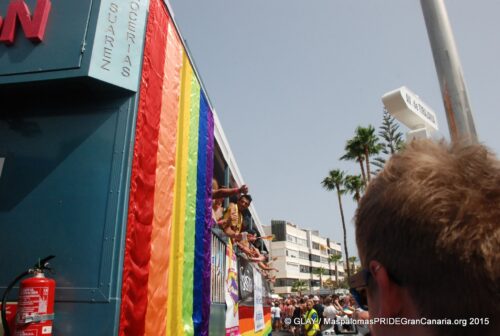 No one seems to know how to join the association or who is involved, under what terms it was constituted nor how to assess or influence the vital decisions being made during the event planning and execution. Is this major annual event subject to public tenders, or is it awarded to those who fulfill a certain criteria? If so, where is that criteria published? More and more the event appears dedicated to a select few individuals, now actively fencing themselves off from the community that built it, occupying a public square, and distilling a protest movement down to a single brand of vodka. And one fizzy drink.
No one seems to know how to join the association or who is involved, under what terms it was constituted nor how to assess or influence the vital decisions being made during the event planning and execution. Is this major annual event subject to public tenders, or is it awarded to those who fulfill a certain criteria? If so, where is that criteria published? More and more the event appears dedicated to a select few individuals, now actively fencing themselves off from the community that built it, occupying a public square, and distilling a protest movement down to a single brand of vodka. And one fizzy drink.
The first weekend of the event saw a significant downturn, according to one entrepreneur, who manages several venues, who also reported early closures due to low attendance. She observed that the event, once a magnet for the LGBTQ+ community, has devolved into a mere music festival. Images provided by local businesses showed that the central square of Yumbo was only lively during the final weekend, with the rest of the event failing to draw any significant crowds.
Key issues identified by the businesses include an overemphasis on electronic music, making the event less appealing to a diverse audience. They also pointed to an excess of private, paid events organised in concert with a private company at the heart of the organisation, Jaifer Events, which is said to have monopolised various venues during the daytime. The extended hours of these events left little opportunity for secondary businesses within Yumbo to benefit, concentrating profits, it is assumed, into the hands of the organisers.
There are questions as to why any events of these type would not have been organised by local Yumbo businesses at the core of the main event, in concert with local venues and the resident community, to ensure a cohesive offering, that focuses itself on the businesses and performers who entertain and serve the Yumbo throughout the year.
These days, it seems, a private brand tries to launch itself off the back of a community event that once attracted huge numbers of visitors, and now acts as a barrier to the very businesses who founded it in the first place. Whoever organises Pride is worthy of applause, it is no simple matter, but to attempt to do so without the community working behind you is to fail to be reasonable and ask the impossible. (to paraphrase Don Darío Jaén Rivero)
Two specific grievances stood out: the erection of a 3.5-metre barrier around the central plaza, which excluded ground-floor businesses from what performances there were, and the transformation of the Pride parade into a massive drinking party (botellón) that clogged walkways and entrances. Additionally, they criticised the organisers for charging a euro for restroom access in a public plaza and encouraging attendees to spend money at the event’s bars, further sidelining local businesses.
Can you hear the drums, Fernando?
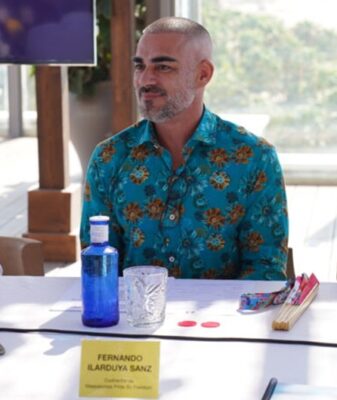 Fernando Ilarduya directs the event he brands “Maspalomas Pride by Freedom”, and does not share the sentiment of Yumbo Centre business owners who felt this year’s Pride was “very weak.” On the contrary, his organisation, he says, has observed a 40% increase in attendance, evidenced by streaming viewership, though no precise figures or further evidence of the claim is offered. Various estimates of attendance range wildly from 30,000 to 300,000.
Fernando Ilarduya directs the event he brands “Maspalomas Pride by Freedom”, and does not share the sentiment of Yumbo Centre business owners who felt this year’s Pride was “very weak.” On the contrary, his organisation, he says, has observed a 40% increase in attendance, evidenced by streaming viewership, though no precise figures or further evidence of the claim is offered. Various estimates of attendance range wildly from 30,000 to 300,000.
“I’ve received nothing but congratulations from attendees and other sectors linked to the event,” Ilarduya said on Tuesday. “The management of the shopping centre congratulated me on the programme of events we carried out, the security measures we implemented, and told me that 99% of the complex worked excellently with Pride.”
However the management of the shopping centre do not speak for the businesses of Yumbo, they speak for the property owners who rent out, and are supposed to maintain, the shopping centre and its commercial units. The bar and shop owners rarely have any input to that.
Ilarduya emphasised that Freedom’s commitment is to ensure everyone benefits from Pride, including the LGBTQ+ community, the municipality, and businesses. He noted that he had already met with the business owners who felt disadvantaged, offering suggestions to help them work as effectively with Pride as the rest of Yumbo.
Ilarduya highlighted that this year, two giant screens were installed on towers in the middle of the plaza so that businesses behind the enclosed area could see what was happening on stage. He also mentioned that the fenced structure was a security measure to control access and prevent dangerous objects from entering the venue.
Responding to complaints about excessive private, paid events, Ilarduya points out that this edition had fewer events outside Yumbo than previous years—only six days of external events compared to the usual nine or ten. He argued that Pride is for all of Maspalomas, not just Yumbo, and noted that various promoters in the municipality benefit from such events.
Ilarduya also refuted claims that Pride is now focused on national tourism. “That’s illogical; I don’t know what sources they’re using, but we have data—from social media, our website statistics, and consultations with tour operators and hotels—that show hotels were full from May 2 to 12 or 14.”
According to a statement released by the organisers, more than 300,000 people attended the galas, parties, and events, with over 40 musical, cultural, and sporting activities. The economic impact of this edition was more than €150 million. The “Freedom Association LGBT Maspalomas” is, they say, already preparing for the next event in 2025, promising more novelties and surprises from May 1 to 11.
Yumbo businesses and community organisations are calling for radical change.
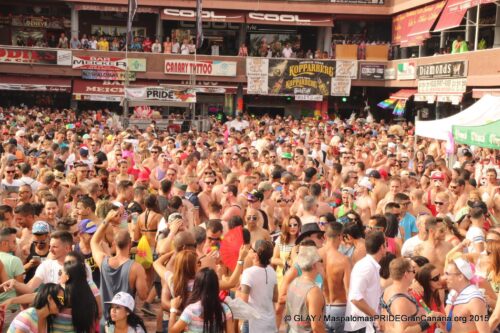 Yumbo business owners believe the essence of Pride is at risk of being lost. The original Maspalomas PRIDE Gran Canaria, overseen by GLAY+ and the Maspalomas community until 2015, was built from the ground up, by volunteers, stakeholders, activists, and public servants, working alongside their institutions. It was a celebration of this community, supported by sponsors but made possible by the people. Tax paying, voting and economically active people. When pride stands in their way, they may begin to stand up. The businesses of Yumbo deserve to feel supported by their town hall, and their island and regional government, but now there are questions as to how a singular organisation has such complete control over a publicly subsidised event in a public square. Where are the public tenders?
Yumbo business owners believe the essence of Pride is at risk of being lost. The original Maspalomas PRIDE Gran Canaria, overseen by GLAY+ and the Maspalomas community until 2015, was built from the ground up, by volunteers, stakeholders, activists, and public servants, working alongside their institutions. It was a celebration of this community, supported by sponsors but made possible by the people. Tax paying, voting and economically active people. When pride stands in their way, they may begin to stand up. The businesses of Yumbo deserve to feel supported by their town hall, and their island and regional government, but now there are questions as to how a singular organisation has such complete control over a publicly subsidised event in a public square. Where are the public tenders?
What we have now is a shadow of the original, once branded simply with the destination name and the purpose of the celebration, supported by a community.
The current event takes the name of a global movement, and the language of liberty, but chooses to be more about profit than community.
The consensus seems clear: without significant change, Maspalomas Pride risks losing its identity entirely, becoming just another commercial venture rather than an authentic celebration of life, love, and diversity. A protest against injustice. Maspalomas deserves an event of which to be proud.
If we want nice things, we are all going to need to work together.










